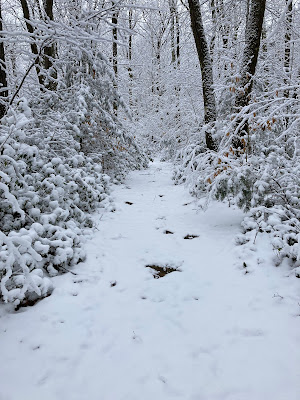Westfield, Massachusetts - "One Grenadier Froze To Death"
On October 28, 1777, the two thousand German prisoners from General John Burgoyne's army who surrendered at Saratoga reached Westfield, Massachusetts. After leaving Great Barrington on the 26th they had marched through "a desolate mountain range…", where the roads "were not only very hilly but also stony and rocky". [1] It had already rained for two days, and the weather was getting worse. Brunswick Grenadier Johann Bense would record in his diary: "... again a very wretched march in rain and snow on an impossible road through Westfield... One man from the Grenadiers froze to death.” [2]
The march on the 28th was the most difficult day of their journey. All day “... hail, rain, and snow succeeded one another strangely. The wind penetrated the whole body, no matter how much stuff you had wrapped around you. The wet clothes froze like armor on the body; one grenadier froze to death on the march; many pack-animals bade their masters a last 'Good night'…” [3]
The end of the day's march brought some relief. A German officer wrote that: “Towards evening, after going ten miles, we came to Westfield, a real nice town. The nature of the weather to-day softened the hearts of the inhabitants and they took us in.” [5] Brunswick Grenadier Johann Bense, whose diary records that most nights since the surrender he had slept in the woods, and "an old cellar" in Blandford on the 27th, was at last able to sleep inside for a night, as he noted: "We were quartered 5 miles beyond Westfield…” [6]
Westfield, Massachusetts, where they stopped, had been settled by Europeans in 1660. After several days of travel through what they considered the wilderness, the Germans were impressed. "Westfield is 10 Engl. miles from Blandford" recalled one, "and a very upright little town with many very well built houses, a delight for the eyes. The inhabitants of this place are very well-to-do." [7]
In 1922, the Reverend John H. Lockwood, D.D., pastor of the town's Congregational church, wrote and published a history of the town "in Colonial and Revolutionary Times". His account drew heavily on town records and other primary sources, but unfortunately he accepted competing claims by other towns to conclude: “It is distressing to lose confidence in the tradition so long fondly and universally cherished in Westfield relative to the presence of General Burgoyne among that group of prisoners. Evidence to the contrary however is too strong to be controverted. The well attested fact that he was in Hadley and presented a sword to his host there has been accepted ...”. [8]
There were those in Hadley who claimed that Burgoyne passed through their town after his surrender at Saratoga. It wasn't true. Brigadier-General William Whipple, who along with Brigadier-General John Glover escorted Burgoyne from Albany to Cambridge, recorded in his journal that they stayed in Westfield, a few days after the Germans left. Whipple's entry for October 31st noted that he, Glover and Burgoyne: "... took Breakfast at Chadwicks & set out for Springs which is 10 miles this is in the middle of the Green wood set out from Springs at 11 o’clock and arrived at Glasco about 2 [o’clock] 11 miles here made a short halt & at 3 set out for Westfield 10 miles where arrivd about 6 got good quarters at Fowlers Tavern I lodged at Col. Moseleys" [9]Lockwood made a second mistake with regard to the Convention Army, when he urged his readers to take comfort in the role played by one of their native sons and his regiment, claiming: "There is some compensation for the discomfort of our shattered tradition relative to Burgoyne in the fact thus established that the brigade of which Col William Shepard's regiment formed a component part was honored with the responsibility of guarding that great batch of prisoners..." [10] While Colonel Shepard and his 4th Massachusetts Regiment were assigned to Glover's brigade during the Saratoga campaign, and Glover escorted Burgoyne to Cambridge, Shepherd and the other regiments in the brigade marched south to support Major-General Israel Putnam in the lower Hudson River valley after the surrender, not east towards Boston with the Convention Army. [11]
What was Westfield in 1777 is now two towns, Westfield, and to its west Russell, incorporated in 1792. The inn where Burgoyne stayed, the Landlord Fowler Tavern at 171 Main Street (Route 20) in Westfield, still exists, but it is not open to the public. Its original door is on display though - but in New York City, at the Metropolitan Museum of Art.





Comments
Post a Comment